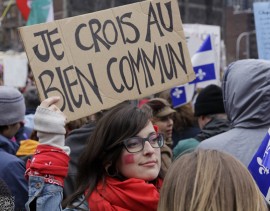The Maple Spring came to Vancouver last week. And it was absolutely beautiful.
Last Friday, a packed house at the W2 Media Cafe in Vancouver heard stirring speeches by student leaders from Quebec. This inspiring night was the finale of a whistlestop tour that visited seven cities in seven days, with speaking events also taking place in London, Toronto, Winnipeg, Saskatoon, Regina and Victoria.
The Vancouver wrap-up event of this ‘Maple Tour’ across Canada was billed as a victory party, since these students and Quebec’s social movements had just recently pulled off a stunning hat trick: helping drive Jean Charest from power, blocking the proposed tuition hike and forcing the repeal of an attack on civil liberties known as Bill 78.
All this was the result of what has become known as the Maple Spring, an unprecedented social movement that included the largest protests in Canadian history.
Chloe Zawadzki-Turcotte and Gabriel Nadeau-Dubois both played key roles during this year’s momentous student movement with CLASSE — the largest of the student unions on strike — and their speeches in Vancouver revealed wisdom far beyond their years.
Gabriel became a polarizing figure throughout Quebec society, emerging as the media face of the strike. As a symbol of the students’ unity and determination to defeat the government, he was demonized, smeared and belittled by many right-wing voices in the press and in political life. At his Vancouver talk, it was very clear why he got under the skin of those who support the status quo; he’s a precocious, attractive kid who can distill and present complex, radical ideas in clear and compelling language.
Speaking in a second language he’s only very recently used with any regularity, he outlined the ideological importance of fighting tuition fees — no matter how small the proposed hike. Once young people and society at large accept education as a commodity, or as just another financial investment, you have already begun to lose. Education is a right, Gabriel explained, and defending that right is essential for defending equity throughout an entire society.
He also urged the audience to take what they could learn from Quebec’s example — especially in terms of the democratic structures which were crucial to the strike’s power — and apply it strategically to their own, local political circumstances. This openness to progressives throughout the rest of Canada bodes well for building a truly powerful cross-country movement against the Harper agenda.
Those of us in the rest of Canada, especially progressive-minded people out West, have to reciprocate this generosity of spirit that seeks out understanding and united action.
We should brush up on our French, and start to follow politics in Quebec more seriously. Along with that, we should bone up on our history, and we should be ruthlessly honest.
The Quebecois people suffered under the boot of a colonial enterprise, even before Canada had its present name. Whatever your position on Quebec independence, only an ignoramus would deny this. Yet too many do. The right-wing chauvinists are able to get mileage out of cheap anti-Quebec rhetoric in the rest of country because too many in the political centre and even on the left are, well, pretty clueless.
People need to go back and read about the linguistic and class oppression that ruled in Quebec for so many decades. The bosses were Anglos, the workers were French. The Quebecois had to fight bitterly just for the right to be given orders at work in their own language.
The movement for Quebec sovereignty did not show up one day, ex nihilo. Like many other nationalisms, it emerged from, and was shaped by, a history of colonialism and oppression. The persistence of a sovereigntist movement might not, it turns out, be explained by pathologies inherent to the Quebecois. The pathology could be ours.
Canada’s first prime minister was a raging chauvinist and racist. When Metis leader Louis Riel was about to be hanged in 1885, Macdonald famously quipped, “He shall hang though every dog in Québec bark in his favour.”
Sorry, John A. Macdonald: We know the truth, and so the dogs are still barking, only there’s a lot more of us now. Glory to Riel, Gabriel Dumont and all those who fought for equal rights for French-speaking and Indigenous peoples.
All of that is my own digression, as the students did not address issues relating to sovereignty. But their talk provoked these thoughts.
Whatever has kept us apart in the past must be cleared away to allow common struggle against common enemies. Forget the Clarity Act. Let’s just act and speak with clarity and honesty about the realities of our shared history. The rest will take care of itself. This, of course, must include the reality of colonialist dispossession of Indigenous peoples at the hands of both English and French.
The beautiful slogan that CLASSE carried on its website’s masthead and had written on the banners leading many a mass march through the streets of Montreal was crystal clear: Ensemble, bloquons la hausse. Together, block the tuition hike.
After the inspiration of this year’s Maple Spring, and after the inspiration of last week’s Maple Tour, I dare to dream that we can win real, tangible victories here in B.C. and against Harper.
Ensemble, bloquons Enbridge et Kinder Morgan. Together, block Enbridge and Kinder Morgan.
Ensemble, bloquons l’austérité. Together, block austerity.
Ensemble, nous bloquerons Harper.
A version of the piece first appeared in The Source / La Source Newspaper, where I write a bi-weekly column.



